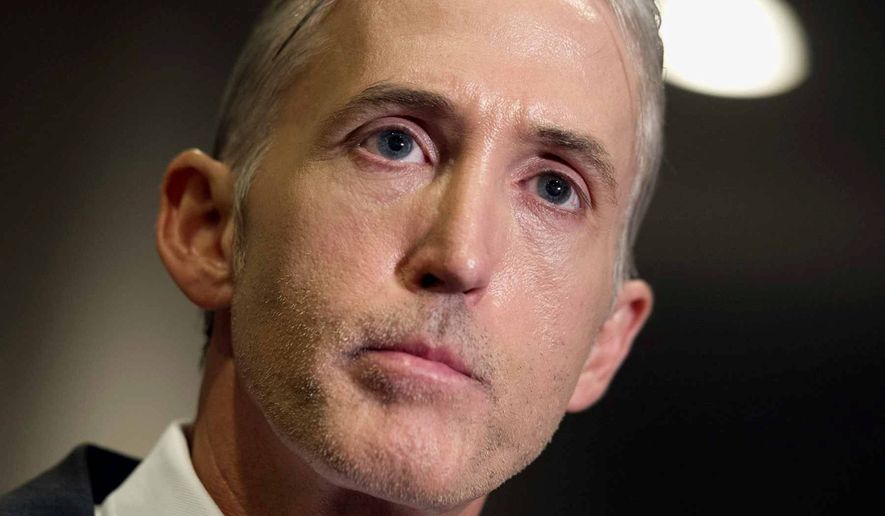The Lawbreaker 'Too Big to Jail'
By Wesley Pruden
WashingtonTimes.com

Trey Gowdy. (Associated Press)
James Comey continues to supply the champagne at Hillary Clinton’s headquarters, after making sure she wouldn’t have to spend Election Night in a 5 by 7 jail cell. That wouldn’t be big enough to accommodate her pants suits.
Mr. Comey continues to shred what’s left of his reputation as a fearless tough guy eager to do the right thing. His diagnosis of Hillary’s character and competence stopped just short of doing anything about her breaking of the law. President Obama says Hillary would be the most qualified president since Thomas Jefferson, greater than Madison, Monroe, Lincoln, the two Roosevelts and presumably even his own magnificent self. But Mr. Comey says Hillary was nevertheless not “sophisticated” enough to know that she shouldn’t put the nation’s security secrets at the mercy of Russian and Chinese hackers.
But despite the FBI director’s imaginative special pleading to preserve Hillary’s presidential credentials, she’s stuck with the reputation she made for herself. Mr. Comey’s gift to Hillary of a “soiled bill of health,” as one clever headline writer put it, recalls the vote at a country church in the Arkansas of my youth, where the congregation had a falling out with the pastor. The preacher demanded a showdown with a vote of confidence. When the parson prevailed by a vote of 33 to 31, he declared victory: “This is a heartwarming vote of confidence that proves that the congregation is with me a hundred per cent.”
Hillary’s “vote of confidence” from Mr. Comey is more humiliation than vindication, because his bill of the particulars of her high crimes and misdemeanors is the indictment he was afraid to recommend to Atty. Gen. Loretta Lynch. Mzz Lynch was free to do the right thing, of course, to bring the Clintons to heel after decades of wanton corruption and debasement of the public trust. But the age of miracles is past.
Rep. Trey Gowdy of South Carolina, the chairman of the House Select Committee investigating the disgrace at Benghazi and a former federal prosecutor himself, destroyed Mr. Comey’s conclusion that because Hillary meant no harm she should be free of the punishment prescribed for others.
“In your old job [as a federal prosecutor],” he told the FBI director at a congressional hearing Thursday, “you would prove intent by showing the jury evidence of a complex scheme that was designed for the very purpose of concealing the public record, and you would be arguing in addition to concealment the destruction that you and I just talked about, or certainly the failure to preserve. Would you argue all that under heading of content — intent? You would also be arguing the pervasiveness of the scheme, when it started, when it ended and number of emails, whether they were originally classified or up-classified, you would argue all of that under the heading of intent.
“You would also, probably under common scheme or plan, argue the burn bags of daily calendar entries or the missing daily calendar entries as a common scheme or plan to conceal. Two days ago, director, you said a reasonable person should have known [that] a private email is no place to send and receive classified information. You’re right.
“An average person does know not to do that. This is no average person. This is a former first lady, a former United States senator, and a former secretary of state that the president now contends is the most competent, qualified person to be president since Jefferson … She affirmatively rejected efforts to give her a [secure government email] account. She kept these private emails for almost two years and only turned them over to Congress because we found out she had a private email account.
“So you have a rogue email system set up before she took the oath of office. Thousands of what we now know to be classified emails, some of which were classified at the time. One of her more frequent email comrades was in fact hacked, and you don’t know whether or not [Hillary] was. And this scheme took place over a long period of time and resulted in the destruction of public records yet you say there is insufficient evidence of intent.
“You say careless but not intentionally. You and I both know intent is really difficult to prove. Very rarely do defendants announce, ‘On this date I intend to break this criminal code section. Just to put everyone on notice, I am going to break the law on this date.’ It never happens that way. You have to do it with circumstantial evidence … “.
Of circumstantial evidence there is sufficient plenty. It was outweighed only by the politics of a presidential campaign.
• Wesley
Pruden is editor-in-chief of The Times.

